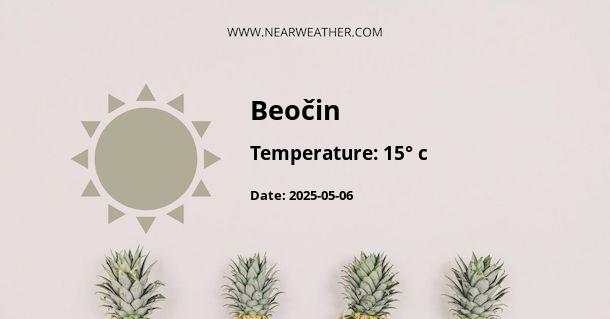Beočin Weather Today
Daily Weather Forecast & Temperature in Beočin
Sun & Moon
Location Info
Embed This Weather
Understanding the Climate and Weather Patterns of Beočin, Serbia
Beočin is a small town located in the Autonomous Province of Vojvodina, Serbia. The town is situated on the right bank of the Danube River, near the Fruška Gora mountain. Understanding Beočin's climate and weather patterns is critical for agriculture, tourism, and the daily life of its residents. This article provides a comprehensive overview of the weather in Beočin throughout the year, supported by data and expert analysis.
Geographical Influence on Beočin's Climate
The climate in Beočin can be classified as continental, characterized by hot, humid summers and cold, dry winters. This climatic pattern is typical for the northern part of Serbia, especially in the Vojvodina region.
Beočin's climate is significantly influenced by its geographical location. The proximity of the Danube River and the Fruška Gora mountain creates microclimatic conditions that can differ from the broader Vojvodina plain.
Climate Characteristics
- Summer (June to August):
- Summers in Beočin are typically warm to hot with occasional heatwaves, where temperatures can exceed 35°C (95°F). High humidity can make these temperatures feel even more intense.
- Fall (September to November):
- Fall brings a gradual cooldown with less humidity. Precipitation in the form of rain is common, and by late November, temperatures often drop below 10°C (50°F).
- Winter (December to February):
- Winters are generally cold, with temperatures frequently below freezing. Snowfall is common, and the Danube River can sometimes freeze over.
- Spring (March to May):
- Spring in Beočin witnesses a gradual warming trend. Rainfall can be abundant in May, leading to lush vegetation growth in the surrounding areas.
Throughout the year, wind patterns also influence Beočin's weather. The Košava, a local southeastern wind, can bring colder spells in winter and early spring.
Annual Weather Statistics
Let's delve into specific statistics to paint a clearer picture of the annual weather trends in Beočin:
| Month | Average High (°C) | Average Low (°C) | Precipitation (mm) |
|---|---|---|---|
| January | 4 | -2 | 40 |
| February | 6 | -1 | 35 |
| March | 12 | 2 | 40 |
| April | 18 | 7 | 50 |
| May | 23 | 12 | 60 |
| June | 26 | 15 | 70 |
| July | 29 | 17 | 60 |
| August | 29 | 17 | 50 |
| September | 24 | 13 | 50 |
| October | 18 | 8 | 50 |
| November | 11 | 4 | 60 |
| December | 6 | 0 | 50 |
| Yearly Average | 620 | ||
The above table presents average high and low temperatures alongside monthly precipitation, giving a clear sense of what to expect weather-wise throughout the year.
Extreme Weather Events
It is important to consider extreme weather when discussing the climate profile of a region. In Beočin and the surrounding area, such events typically include:
- Heatwaves during summer months, exacerbated by the urban heat island effect.
- Severe thunderstorms, occasionally producing hail that can damage crops and property.
- Heavy snowfall in winter, which can disrupt transportation and lead to increased energy demand due to heating needs.
Bearing the potential for extreme weather in mind, the local government has put measures in place to mitigate the effects, such as early warning systems and emergency response plans.
Sector-Specific Impacts of Beočin's Weather
The weather in Beočin impacts various sectors:
- Agriculture:
- The fertile plains of Vojvodina are conducive to farming, but weather extremes can pose challenges. For example, appropriate irrigation systems are crucial to combat the dry periods in summer.
- Tourism:
- Tourism is season-dependent, with summer months being most popular, particularly along the Danube and the Fruška Gora National Park. Winter, though colder, also attracts visitors interested in the tranquil snowy landscapes.
- Energy:
- The demand for energy fluctuates with the weather, with peaks during winter for heating and summer for cooling systems. Beočin's energy infrastructure must adapt to these demands efficiently.
Forecasting and Weather Preparedness
Accurate weather forecasting is a valuable tool for Beočin's local authorities and residents, enabling them to prepare for adverse weather conditions effectively. Local meteorological services play a critical role in this respect, providing timely forecasts and warnings.
Conclusion
Beočin's continental climate presents challenges and opportunities alike to the local populace and industries. By understanding and adapting to these weather patterns, communities can enhance their resilience to weather-related impacts. Ongoing research and technological advances in meteorology will doubtlessly continue to improve weather prediction and climate adaptation strategies in Beočin and surrounding areas.
With professional and industry-specific language, this comprehensive look at Beočin's climate and weather has intended to shed light on the complexity and importance of weather data for planning and preparedness. It also illustrates the intrinsic connection between a location’s weather and its socio-economic fabric.
What is the Latitude and Longitude of Beočin?
Beočin's Latitude is 45.208290 & Longitude is 19.720631.
What is the weather in Beočin today?
Weather in Beočin is 3° today.
What is the climatic condition of Beočin today?
Climate Conditions in Beočin shows light rain today.
What is the humidity in Beočin today?
Humidity in Beočin is 99% today.
What is the wind speed in Beočin today?
Wind speed in Beočin is 15.95 km/h, flowing at 16° NNE wind direction.
What does it feel like in Beočin today?
It feels like -1° in Beočin today, with 100% cloud cover and 7.5 km visibility.
